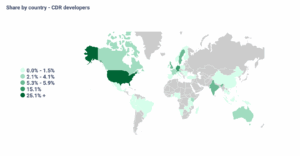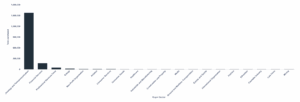
Voluntary Carbon Market Insights & FAQs
Everything you’ve ever wanted to know about the voluntary carbon market – and more!
Biochar Carbon Removal (BCH)
What Is Biochar Carbon Removal and How Does It Work?
- Biochar carbon removal involves producing biochar, a stable form of carbon-rich charcoal, by heating biomass (organic material like agricultural waste, forestry residues, or dedicated crops) in a low-oxygen environment (pyrolysis).
- The resulting biochar is applied to soils, where it sequesters carbon for long periods while also enhancing soil health and productivity.
- Biochar is projected to remove 2-4 GtCO2 per annum by 2050 according to the IPCC.
Why Does Biochar Carbon Removal (BCH) Matter for Tackling Climate Change?
- Biochar production effectively stabilizes carbon from biomass, locking it in soil for hundreds to thousands of years. This creates a carbon-negative cycle, reducing atmospheric CO2 while improving soil fertility, water retention, and agricultural productivity.
- As biochar can be widely adopted due to relatively low costs and multiple co-benefits, it plays a crucial role in global strategies to meet Net Zero emissions targets and to support sustainable agriculture and waste management.
What’s Happening in the Biochar Carbon Removal (BCH) Market Right Now?
- The biochar sector is one of the most commercially active engineered CDR methods; around 2.5 million credits have been sold to date. Prices typically range between $100-200 per ton, and there are currently 335 developers operating multiple facilities worldwide.
Where Are Biochar Carbon Removal (BCH) Projects Happening and How Are They Progressing?
- Biochar carbon removal projects are being developed in many parts of the world, with the largest number of projects in the United States, Germany, Sweden, United Kingdom, India, and Canada.
- Overall, these projects are progressing quickly. Biochar technology is at a higher TRL level, meaning it’s close to large-scale use.
- In terms of the volume of credits sold, the largest amounts come from projects based in Bolivia, Canada, India, and the UK, reflecting where offtakes have been secured.

How Does AlliedOffsets Track Biochar Credit Activity in the Voluntary Carbon Market?
With data from 35+ registries, AlliedOffsets provides the most comprehensive credit tracking in the voluntary carbon market (VCM). Our dataset covers:
- Biochar issuances
- Retirements
- Offtake agreements
- Purchase vs. delivery trends over time
Total credits by transaction type

What Trends Does AlliedOffsets Track in Biochar Credit Buyers?
- The Biochar Carbon Removal (BCH) market is currently dominated by large tech-sector buyers, with Microsoft and Google purchasing the majority of credits.
- At the same time, the buyer landscape is beginning to diversify. New entrants from other industries are increasingly participating in the market, drawn by biochar’s relatively lower cost compared to other durable carbon removal methods.
